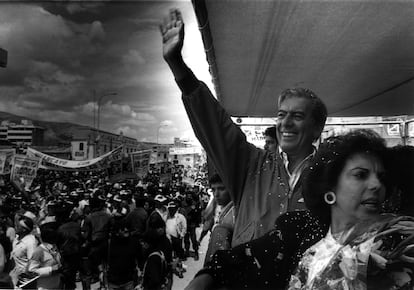From Castro to Thatcher: Vargas Llosa’s journey as a politician
The writer, who was a presidential candidate in Peru in the 1990s, turned from Marxism to liberalism with the zeal of a convert

They warned him not to do it — that it would end badly — but nothing could dissuade him. In 1990, Mario Vargas Llosa ran for the presidency of Peru with the same fervor he had always brought to his typewriter, as if his very life depended on it. He proved to be both a passionate and cerebral candidate, much like the characters in his novels, but ultimately lost at the polls to an agronomist engineer named Alberto Fujimori, who would later become a dictator.
Vargas Llosa claimed he entered politics for moral reasons. His wife, Patricia Llosa, didn’t deny that, but insisted it wasn’t the decisive factor. What truly drove him, she said, was the thrill of living an experience full of excitement — “of writing, in real life, the Great Novel,” as she put it. Vargas Llosa, who died Sunday in Lima at the age of 89, was a scholar, but also a modern-day Jason, sailing a ship in search of adventure.
The influence of Jean-Paul Sartre turned him into a committed writer from an early age. While studying at the University of San Marcos, a public institution where he sat side by side with students who were poor, atheist, communists and cholos from the mountains ,he joined a communist cell named Cahuide, in honor of an Inca commander. He believed socialism was the path to achieving the purity of the “new man” and that this could be achieved through armed struggle. He was an ardent supporter of the Cuban Revolution and admired Fidel Castro, visiting him in Havana five times. On one such visit, alongside other Latin American intellectuals, he listened to Fidel speak for hours in a closed room. He emerged dazed but emotionally moved.
Over time, however, he distanced himself from the left, which he came to associate with authoritarianism and poverty, and embraced liberalism with the zeal of a convert. From Fidel, he turned to Margaret Thatcher, and along the way devoured the works of thinkers like Hayek and Revel. “If Mario looks at a helicopter,” a relative once remarked over dinner, “he’ll explain how liberalism made it possible for parts from all over the world to come together as a whole. Liberalism occupies his mind.”
But before that, Vargas Llosa was a student of Marxism. He began to question it when he felt that the ideology was becoming a form of “brainwashing” that stifled him — as he would later describe it. His engagement with various ideologies was based on intuition, but above all on study and analysis. Because, before being a writer, he was first and foremost a reader — a man sitting under the sun, in a chair, with a book always in his hands.
In 1958, he traveled to Spain on a Javier Prado scholarship to study at Madrid’s Complutense University. There, he severed ties with the Cahuide cell for good. That didn’t stop him, however, from watching in awe on television as the bearded revolutionaries entered Havana on January 8, 1959. Soon after, Vargas Llosa began writing for Casa de las Américas, a Cuban magazine edited by Haydée Santamaría.
This idealistic, revolutionary phase brought him into close contact with Gabriel García Márquez, a fellow Latin American writer 10 years his senior. They met in Caracas after Vargas Llosa was awarded the Rómulo Gallegos Prize. He was immediately captivated by García Márquez’s fiery, poetic prose and went on to write a thesis about him that became a book: Story of a Deicide, considered one of the most brilliant studies of the Colombian’s work. Both would later win the Nobel Prize in Literature — García Márquez in 1982, and Vargas Llosa in 2010.
Their friendship deepened in Barcelona, where they lived as neighbors. García Márquez even became godfather to Vargas Llosa’s second son, Gonzalo. But Fidel Castro — and among other issues — would later divide them. Their break was famously sealed with a punch Vargas Llosa threw at García Márquez in a Mexico City movie theater, an incident he instructed his biographers to explore only after his death.
The catalyst for their falling out was, specifically, the case of Heberto Padilla, a Cuban poet imprisoned for criticizing the regime. Vargas Llosa joined a group of intellectuals — including Susan Sontag, Octavio Paz, Sartre, Cortázar, and García Márquez — in signing a manifesto denouncing Padilla’s detention. The affair became a turning point for many who had supported the Cuban Revolution, including Vargas Llosa.
But García Márquez distanced himself from the protest. When the statement was published, he claimed he had never authorized his name to appear. According to him, it was his friend Plinio Apuleyo Mendoza who, abusing the closeness between them, had assumed García Márquez would support the cause and signed on his behalf.
This marked the end of the young Vargas Llosa who once leaned toward Marxism, and the emergence of a man who would come to think very differently. He also passed briefly through the ranks of Christian Democracy — not out of firm belief, but out of admiration for José Luis Bustamante y Rivero. The respected jurist and fellow Arequipeño —hailing from the same city where Vargas Llosa was born — had been overthrown in a military coup that ushered in an eight-year dictatorship. Vargas Llosa longed to see him return to power.
He found it thrilling to imagine a cultured man of letters leading a Third World country and transforming it into something greater. But Bustamante y Rivero never reclaimed the presidency, choosing instead to dedicate his remaining years to intellectual pursuits. In Vargas Llosa’s own presidential ambitions, there was a sense of historical revenge — a desire to avenge Bustamante y Rivero. Yet neither of them would succeed, as if the throne were reserved only for the barbarians who took their places.
Vargas Llosa remained true to his convictions even in the face of controversy. In 2021, alarmed by the potential rise of Pedro Castillo — a schoolteacher backed by a Marxist party — he called on Peruvians to vote for Keiko Fujimori, daughter of his old rival. Many were stunned to see him endorse a candidate accused of corruption and closely linked to the autocratic legacy of her father. But his family insisted he was being consistent — putting principle above personal grievance.
This pattern was repeated in other countries. In Brazil, he preferred Jair Bolsonaro to Lula da Silva. He lamented Gustavo Petro’s victory in Colombia and regretted that the far-right José Antonio Kast failed to defeat Gabriel Boric in Chile. More recently, he expressed support for Argentina’s libertarian and anarcho-capitalist president, Javier Milei.
Many of these stances were voiced in his column in EL PAÍS, where, beyond being a literary figure, he revealed himself to be a formidable polemicist — one of the few writers capable of going against the prevailing opinion of his own readers.
Vargas Llosa’s foray into presidential politics was rough. His opponents were waiting with stones in their hands. During a televised debate, Fujimori repeatedly referred to him simply as “Vargas,” a deliberate slight meant to diminish him. Both men were vying to succeed Alan García, a president overwhelmed by hyperinflation. García had once tried to befriend the novelist, but failed. In fact, Vargas Llosa had led a protest that successfully derailed García’s attempt to nationalize the banks. From that moment on, García made it his mission to ensure that Vargas Llosa would never become president, resorting to all manner of political sabotage.
Vargas Llosa spoke plainly in the campaign: poverty could not be eliminated by redistributing the little that existed — it required the creation of more wealth. The market needed to be opened. The country’s “rentier” mentality had to be replaced with a modern one, where “civil society and the market are entrusted with the responsibility of economic life.” His liberal theses were transparent. He did not try to mislead anyone.
To his advisors, this honesty was a mistake. When he proposed reducing the size of the state, his opponents spread panic among public employees, warning them that mass layoffs were imminent. To remove any ambiguity, he even appointed a commissioner to oversee the National Privatization Program. He declared himself agnostic in a deeply Catholic country, and — having come to liberalism not from conservatism but from the left — he also defended equal marriage and the right to euthanasia. He toured Asian nations that had transformed from poverty to prosperity within a few decades. He believed Peru could become the Singapore of Latin America.
In fleeing the illusions of communism, Vargas Llosa ran toward the mirage of ultra-liberalism. Yet politics remained a footnote in his life — an appendix, an asterisk. His true passion, his inner fire, was literature. After long, exhausting days on the campaign trail, he would lock himself in a room alone and read the first book he had at hand. In that space, he found purification — an escape from the noise and fury of the world. In books, he found the warrior’s rest.
Sign up for our weekly newsletter to get more English-language news coverage from EL PAÍS USA Edition
Tu suscripción se está usando en otro dispositivo
¿Quieres añadir otro usuario a tu suscripción?
Si continúas leyendo en este dispositivo, no se podrá leer en el otro.
FlechaTu suscripción se está usando en otro dispositivo y solo puedes acceder a EL PAÍS desde un dispositivo a la vez.
Si quieres compartir tu cuenta, cambia tu suscripción a la modalidad Premium, así podrás añadir otro usuario. Cada uno accederá con su propia cuenta de email, lo que os permitirá personalizar vuestra experiencia en EL PAÍS.
¿Tienes una suscripción de empresa? Accede aquí para contratar más cuentas.
En el caso de no saber quién está usando tu cuenta, te recomendamos cambiar tu contraseña aquí.
Si decides continuar compartiendo tu cuenta, este mensaje se mostrará en tu dispositivo y en el de la otra persona que está usando tu cuenta de forma indefinida, afectando a tu experiencia de lectura. Puedes consultar aquí los términos y condiciones de la suscripción digital.









































